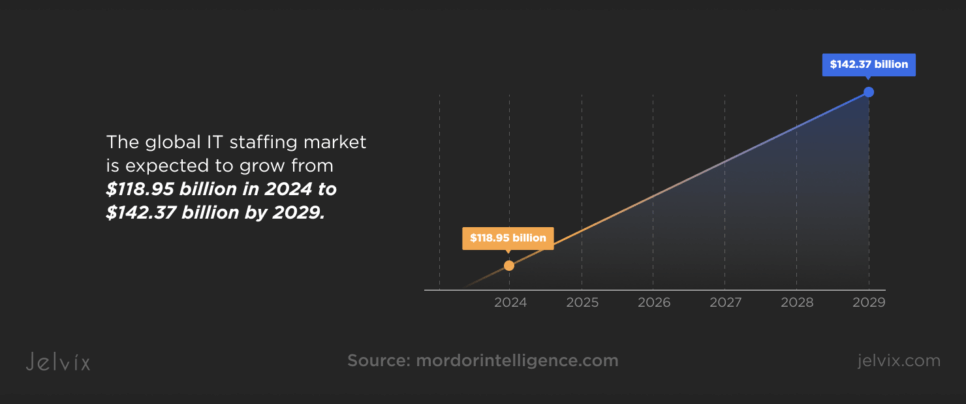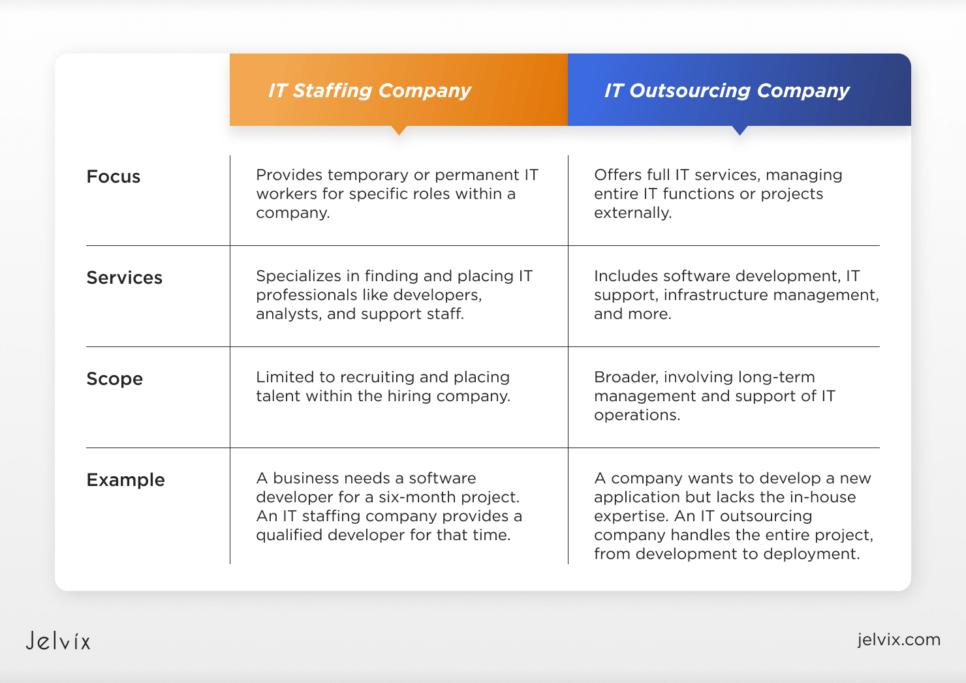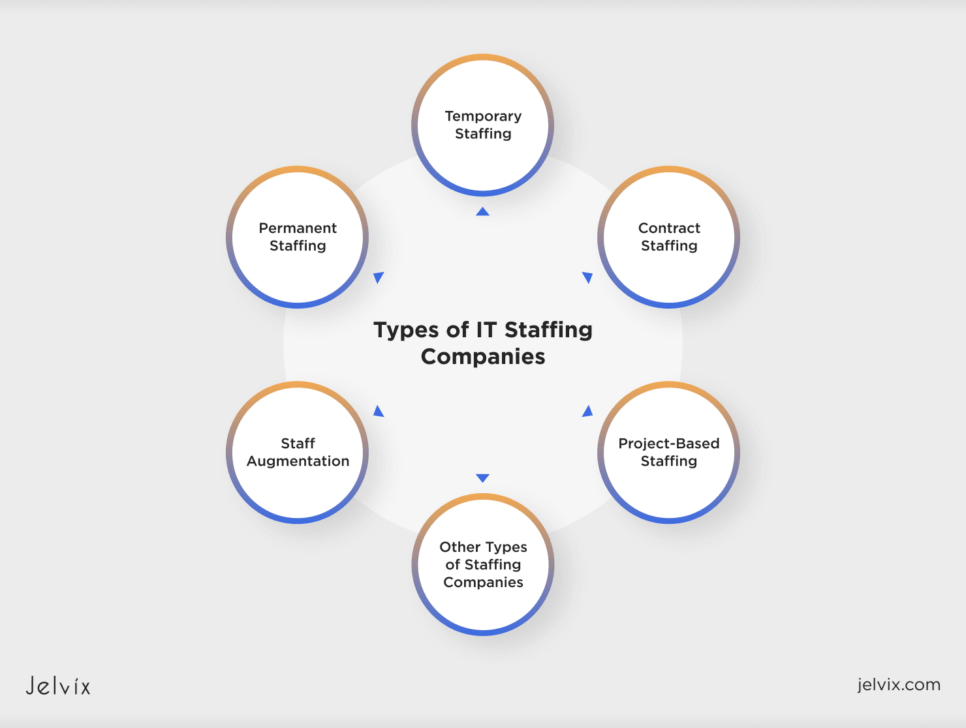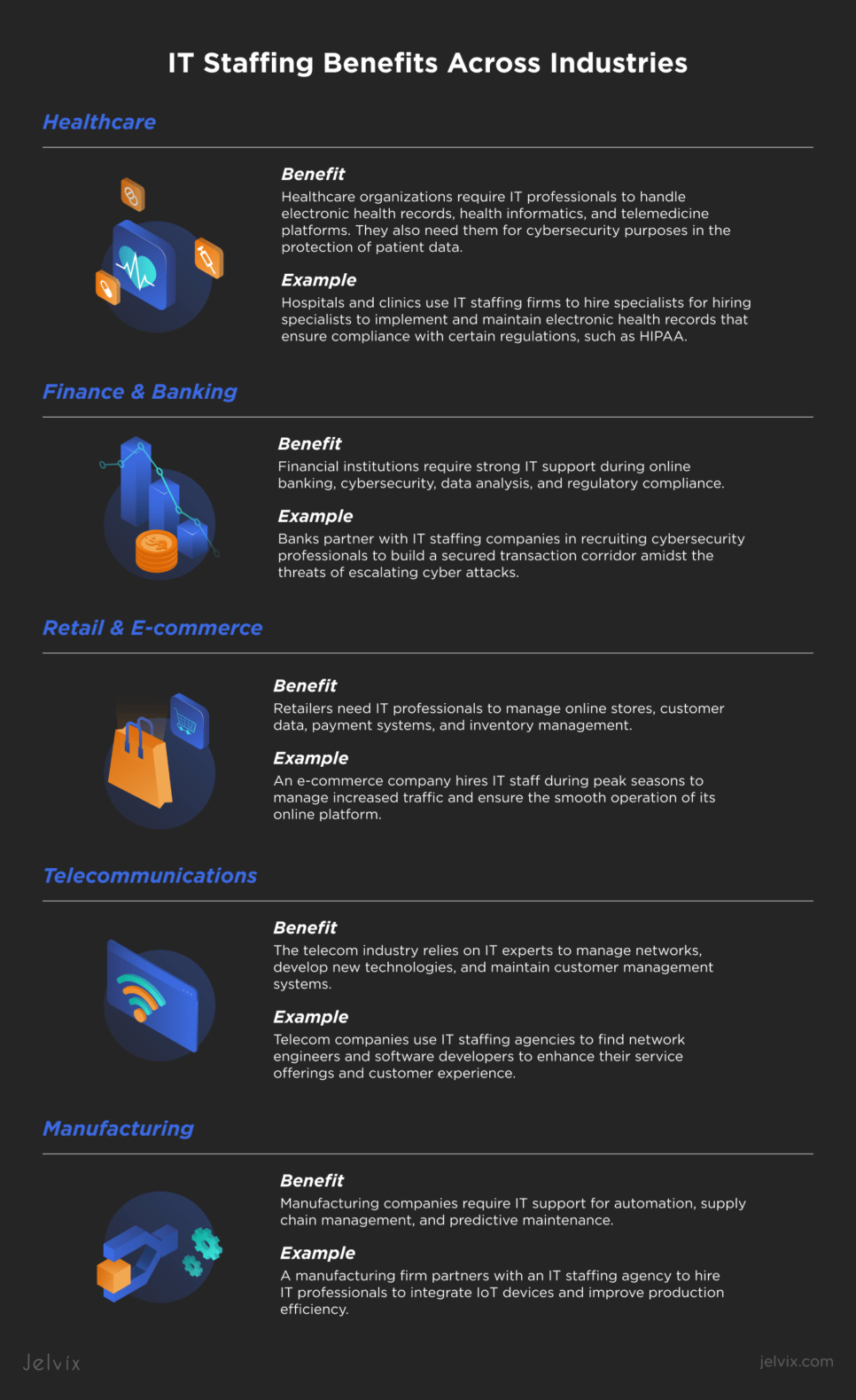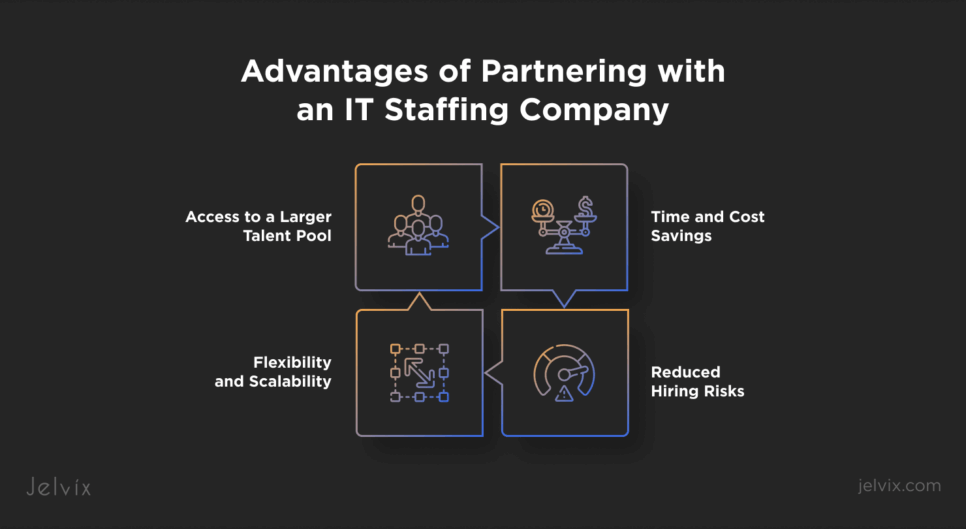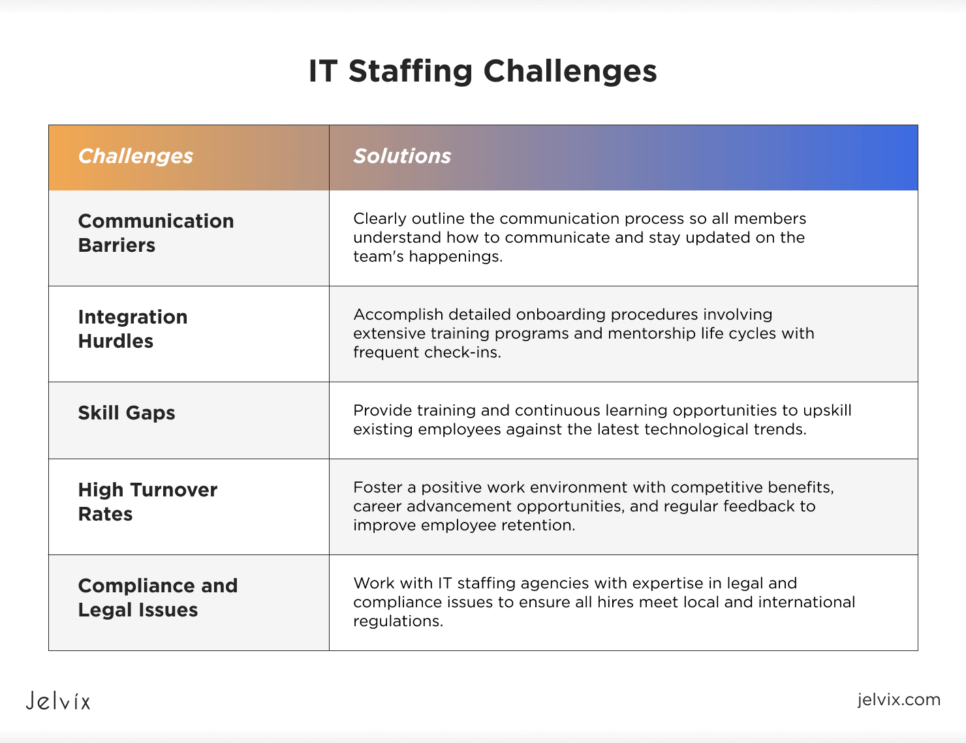The demand for IT staffing services has grown a lot in recent years. This growth is due to the rapid development of technology and the increasing need for digital systems in many industries. The global IT staffing market is expected to grow from $118.95 billion in 2024 to $142.37 billion by 2029.
Modern businesses depend heavily on IT staffing. The applied businesses require proficient IT professionals to manage such activities as cloud computing, cybersecurity, and software development. The accelerated digitization, as a result of the COVID-19 pandemic, has exposed an increased demand for IT professionals. For example, the use of cloud services has greatly increased the demand for IT staff as businesses move their operations online.
New technologies like artificial intelligence (AI) and the Internet of Things (IoT) have created opportunities and challenges that require special IT skills. To stay competitive, businesses turn increasingly to IT staffing companies to quickly and effectively fill these key roles.
What Is an IT Staffing Company?
An IT staffing company is a specialized agency that helps businesses find IT professionals. These companies act as a bridge, so to speak, between organizations and the right candidate counterparts to match their technical needs. With their vast network and knowledge of information technology, they can match job seekers to open positions based on skill sets and career aspirations.
IT staffing firms make the hiring process easier for businesses. They take responsibility for the tasks such as job advertising, candidate screening, and initial interviews. This allows the company to stay focused on the core activities while the staffing company handles the recruitment details. To the job seeker, they avail various jobs, some not even publicized. They also have add-on services to enhance the success of the candidates by way of resume writing and interview coaching.
The Difference Between an IT Staffing Company and an IT Outsourcing Company
While both IT staffing and IT outsourcing companies provide valuable services to businesses, they operate differently.
What Are IT Staffing Services?
IT staffing services cater to different requirements, from temporary hires to long-term placements. Here’s a detailed look at the types of IT staffing solutions provided by information technology staffing agencies:
- Temporary Staffing. Temporary staffing involves hiring IT professionals for short-term projects or to cover temporary absences. This service is perfect for businesses needing to quickly scale up their workforce to handle increased workloads or special projects. For instance, a retail company might need extra IT support during the holiday season. An IT staffing firm can provide temporary staff to manage the increased workload.
- Permanent Placement. Permanent placement services help companies find and hire IT professionals for long-term roles. IT staffing companies handle the entire recruitment process, from job advertising and candidate screening to final interviews. This ensures that the best candidates are matched with permanent positions within the hiring company. For example, a tech startup might require a permanent software developer. The IT staffing company finds and places a qualified developer in a full-time role within the startup.
- Project-Based Staffing. Project-based staffing provides a team of IT professionals for specific projects for a set period. This service is beneficial for companies needing specialized skills for unique projects without requiring full-time staff after the project’s completion. A healthcare organization might need to implement a new data management system. An IT staffing firm can supply a team of IT experts, including system analysts, developers, and project managers, to complete the project.
IT staffing companies often provide additional services beyond finding and placing IT professionals. These services include:
- HR Consulting: Assisting organizations with human resource strategies and compliance.
- Outplacement Services: Assisting laid-off employees in obtaining other jobs.
- Employee Engagement Programs: Improvement in Employee Satisfaction and Retention.
- Upskilling and Training: Undertaking training programs to enhance the employees’ skills
These services help businesses manage their IT staffing needs effectively. By using the expertise and networks of IT staffing firms, companies can easily handle various staffing challenges.
Types of IT Staffing Companies
There are various types of IT staffing companies, each specializing in different areas to meet the diverse needs of businesses.
Temporary Staffing
This is the recruitment of any IT professional based on a project or temporary leave. This will be suitable for increasing staff quickly in any business for big workload tasks or special projects. For example, a retail business may want more IT support during the holiday season. An IT staffing company should be there to provide the required temporary staff to support the extra workload:
- helps manage fluctuating workloads and seasonal demands;
- common in industries like retail, healthcare, and event planning where staffing needs can vary.
Pros
- Flexible: Quickly adjust the workforce based on the project needs.
- Cost-Effective: Lower costs as there are no long-term commitments or benefits.
- Fast: Quickly fill immediate staffing needs.
Cons
- High Turnover: Temporary staff may leave once their contract ends.
- Less Committed: May not be as invested in long-term goals.
- Integration Issues: Harder to integrate with existing teams.
Permanent Staffing
Permanent placement agencies specialize in finding and placing IT professionals for permanent employment within companies. They maintain the entire recruitment process from advertising to the final interviews and ensure proper matching of candidates for permanent positions.
Pros
- Stable: Builds a stable, long-term team.
- Invested: Employees are more likely to care about the company’s success.
- Cultural Fit: Easier to ensure alignment with company culture.
Cons
- Expensive: Higher costs due to salaries and benefits.
- Time-Consuming: Lengthy hiring process.
- Risk: A higher risk if the hire is not a good fit.
Contract Staffing
Project-based staffing companies provide a full team of IT professionals for specific project work:
- useful for companies that require specialized skills for particular projects;
- staff are hired for the duration of the project and released upon completion;
- helps manage costs by aligning expenses with project timelines.
Pros
- Specialized Skills: Access to experts for specific projects.
- Flexible: Hire for the duration of the project only.
- Cost Control: Pay only for the contract period.
Cons
- Integration: Temporary nature can lead to integration challenges.
- Less Commitment: Contractors may not be committed to long-term success.
- Complex Contracts: Managing contracts can be complex.
Staff Augmentation
Staff augmentation is the process where temporary IT personnel are brought into an organization to augment its internal scenario. Businesses can fill skill gaps without huge long-term investments, thus studying flexibility and adaptability for project needs.
Pros
- Scalable: Quickly scale the team as needed.
- Expertise: Access a wide range of skills.
- Control: Maintain control over the project.
Cons
- Expensive: Can be more costly than other models.
- Integration: Challenges in integrating external staff.
- Dependency: Risk of becoming too dependent on augmented staff.
Project-Based Staffing
Freelance staffing agencies help businesses get connected with freelance individuals offering their IT services on a project-by-project basis, facilitating urgently needed specialized skill work and key innovations without long-term employment commitments:
- allows access to a wide range of specialized skills;
- cost-effective as businesses pay for specific tasks.
Pros
- Focused: Staff hired with specific project goals in mind.
- Efficient: Ensures necessary skills for the project.
- Cost Savings: Only pay for the project duration.
Cons
- Temporary: Staff may leave after the project, causing knowledge loss.
- Integration: Temporary staff may not fully integrate.
- Continuity: Projects can be delayed if the key staff leave.
Other Types of Staffing Companies
Executive search firms, also known as headhunters, specialize in recruiting top-level executives and highly skilled professionals. They use targeted search techniques to attract passive candidates who are not actively seeking new opportunities.
Niche or industry-specific staffing agencies focus on specific industries or roles, offering specialized knowledge and targeted recruiting services. For example, tech staffing agencies concentrate on finding IT specialists like developers and network engineers:
- deep industry knowledge and expertise;
- attract candidates with the precise skills needed for specialized roles;
- higher fees due to specialized services.
Professional Employer Organizations (PEOs) provide comprehensive HR services, including payroll, benefits administration, and compliance management. They handle the administrative functions, allowing companies to focus on their core business activities.
Recruitment Process Outsourcing (RPO) firms handle the entire recruitment process of a company through scalable, tailored hiring solutions. They do everything from sourcing candidates to bringing them onboard—end-to-end recruitment experience.
These categories help businesses choose the right type of staffing service to meet their needs, ensuring they can find the right talent at the right time.
Advantages of Partnering with an IT Staffing Company
Are staffing agencies worth it? Partnering with an IT staffing company offers numerous benefits that can help businesses manage their workforce more efficiently.
Access to a Larger Talent Pool
One of the most significant benefits of partnering with an IT staffing company is the access to a larger talent pool. IT staffing companies maintain extensive networks and databases of pre-screened, qualified candidates across various industries and specializations:
IT staffing services are particularly beneficial for the industries that rely heavily on technology and require specialized IT skills. Some of these industries include:
- Benefit: Healthcare organizations require IT professionals to handle electronic health records, health informatics, and telemedicine platforms. They also need them for cybersecurity purposes in the protection of patient data.
- Example: Hospitals and clinics use IT staffing firms to hire specialists for hiring specialists to implement and maintain electronic health records that ensure compliance with certain regulations, such as HIPAA.
Discover how Jelvix developed a comprehensive Electronic Health Record (EHR) system to streamline patient data management, enhance workflow efficiency, and improve healthcare outcomes.
- Benefit: Financial institutions require strong IT support during online banking, cybersecurity, data analysis, and regulatory compliance;
- Example: Banks partner with IT staffing companies in recruiting cybersecurity professionals to build a secured transaction corridor amidst the threats of escalating cyber attacks.
- Benefit: Retailers need IT professionals to manage online stores, customer data, payment systems, and inventory management;
- Example: An e-commerce company hires IT staff during peak seasons to manage increased traffic and ensure the smooth operation of its online platform.
Telecommunications
- Benefit: The telecom industry relies on IT experts to manage networks, develop new technologies, and maintain customer management systems;
- Example: Telecom companies use IT staffing agencies to find network engineers and software developers to enhance their service offerings and customer experience.
Manufacturing
- Benefit: Manufacturing companies require IT support for automation, supply chain management, and predictive maintenance;
- Example: A manufacturing firm partners with an IT staffing agency to hire IT professionals to integrate IoT devices and improve production efficiency.
Time and Cost Savings
IT staffing companies handle recruitment, including job postings, resume screenings, and initial interviews, saving businesses significant time and resources.
Let’s calculate together. A medium-sized company wanted to hire five software developers. It managed to save around $10,000 on job posting, background verifications, and preliminary interview-related expenses by engaging an IT staffing firm. The staffing firm, in turn, took a markup of 20% of the first-year salary for every developer ($90,000/yr), which is $18,000 per developer. That puts them at $10,000 per developer in savings from the possible $28,000 per developer cost associated with in-house hiring, totaling $50,000 for all five. These are rough estimates, based on some common industry estimates; the actual costs may vary depending on circumstances and locations.
Flexibility and Scalability
IT staffing companies provide businesses with the flexibility to scale their workforce up or down based on project needs or seasonal demands.
Reduced Hiring Risks
Partnering with an IT staffing company reduces hiring risks in several ways:
- In-Depth Vetting System: IT staffing firms do extensive background investigation, reference checking, and skill evaluation for the candidates to be highly qualified and credible.
- Candidate Matching Expertise: Companies of this kind specialize in understanding client requirements and matching candidates with the skills that suit company cultures to ensure less turnover and more satisfaction.
- Temporary-to-Permanent Hire Options: This would enable organizations to firm up on any candidate’s performance before getting into any long-term commitment and reduce the risk of bad hires.
- Compliance and Legal Risks: A staffing agency ensures that its hiring is done according to the letter of the law, thus decreasing legal risks associated with employment-practice liability.
These benefits explain how the alliance with an IT staffing company can benefit the businesses. They provide access to a wider talent pool and save time and money. The expertise of such firms can be used by the companies to solve their problems in terms of staffing and focus on the main activity.
IT Staffing Challenges
Hiring IT staff can present various challenges for businesses. Here are some common issues and strategies to overcome them.
Communication Barriers
Challenge: Effective communication is essential, especially when dealing with remote or globally distributed IT teams. Misunderstandings and lack of real-time interaction can lead to delays and project failures.
Strategy: Set up regular video conferencing and collaboration using Slack or Microsoft Teams (or other tools). Clearly outline the communication process so all members understand how to communicate and stay updated on the team’s happenings. Foster open communication in which staff members are comfortable sharing ideas and airing their views.
Integration Hurdles
Challenge: Integrating new IT staff into existing teams can be challenging, particularly if they are remote. New hires may struggle to adapt to the company’s workflows and culture.
Strategy: Accomplish detailed onboarding procedures involving extensive training programs and mentorship life cycles with frequent check-ins to help new employees settle down and get active quickly. Utilize onboarding software to ensure new employees access necessary resources and information.
Skill Gaps
Challenge: Finding candidates with the exact skills required for specific IT roles can be difficult. Rapid technological advancements mean that skill requirements are constantly evolving.
Strategy: Provide training and continuous learning opportunities to upskill existing employees against the latest technological trends.
High Turnover Rates
Challenge: The IT industry often experiences high turnover rates, making it hard to maintain a stable team. Frequent personnel changes can disrupt project continuity and team dynamics.
Strategy: Foster a positive work environment with competitive benefits, career advancement opportunities, and regular feedback to improve employee retention. Conduct exit interviews to understand the reasons behind turnover and address any underlying issues
Compliance and Legal Issues
Challenge: Navigating the legal aspects of hiring, especially for international employees, can be complex. Various regulations and compliance issues must be adhered to.
Strategy: Work with IT staffing agencies with expertise in legal and compliance issues to ensure all hires meet local and international regulations. Stay updated with the latest employment laws and ensure all HR practices comply with legal standards .
By addressing common IT staffing challenges, businesses can improve their hiring processes. Partnering with a reliable IT staffing agency, using strong communication practices, and focusing on smooth integration and retention can help overcome obstacles. This approach ensures businesses can build effective IT teams and concentrate on their main activities, leading to success.
Choosing the Right IT Staffing Agency
Choosing the correct IT staffing agency is essential for effectively fulfilling your business requirements. This is how you can pick one of the best IT staffing companies:
- Specialization is key. Look for agencies focusing on IT staffing, as they will understand the technical skills and industry trends better than general staffing firms. For example, if you need cybersecurity experts, an agency with experience in that field will be more effective.
- Reputation matters. Check reviews, testimonials, and case studies to gauge the agency’s success rate and client satisfaction. Agencies with a strong reputation are likely to provide better service.
- A large and diverse candidate pool is essential. Ensure the agency has a wide range of pre-screened candidates to increase the chances of finding the right fit.
- Understand the screening process. A thorough vetting process, including background checks and skill assessments, ensures you get qualified and reliable candidates.
- Flexibility in staffing solutions is important. The agency should offer various staffing options, such as temporary, permanent, and project-based.
- Costs are also crucial. Understand the agency’s pricing structure and ensure it aligns with your budget. Compare the costs with the potential benefits and savings the agency provides.
To get the best out of the partnership with an IT staffing company, communicate openly and understand its processes and tools to see whether they are aligned according to your needs. Start something small so that they prove themselves, working on showing that it’s going to be a good adjustment for your business. This approach will feel out of their capabilities and satisfy expectations. Such a relationship can be long-term and effective if you follow these steps with the IT staffing partner.
No matter which partnership model you choose—IT staffing or outsourcing—it is crucial to be careful when selecting your partner. That’s where Jelvix comes in. With our large team of experts across various fields, we’re confident you will benefit from working with us.
Ready to take your business to the next level? Partner with Jevix today and find the IT talent you need to succeed! Contact us now to get started.
FAQ
What industries benefit most from IT staffing services?
Industries such as finance, healthcare, retail, and technology benefit significantly from IT staffing services due to their high demand for specialized tech talent and the rapid pace of technological advancements. These industries often require a range of IT skills, from cybersecurity to software development, making staffing agencies essential for meeting their diverse needs.
How do IT staffing companies ensure the quality of their candidates?
IT staffing companies utilize a rigorous vetting process that includes technical assessments, interviews, and background checks. They also maintain a database of pre-screened candidates with verified skills and experience. This ensures that the professionals they recommend are qualified and capable of meeting the client’s specific requirements.
Can IT staffing companies provide remote talent?
Yes, many IT staffing companies offer remote staffing solutions, allowing businesses to hire skilled professionals from different geographical locations. This flexibility is especially valuable in today’s globalized and digitally connected world, enabling companies to access a broader talent pool without geographical limitations.
How do IT staffing services handle rapidly changing technology needs?
IT staffing companies stay updated with the latest technology trends and continuously train their talent pool to adapt to new tools and methodologies. They offer specialized training programs and certifications, ensuring their candidates are proficient with current and emerging technologies.
What are the cost implications of using an IT staffing agency?
The cost of using an IT staffing agency can vary based on factors such as the duration of the contract, the expertise required, and the market demand for specific skills. However, partnering with a staffing agency can save costs in the long run by minimizing hiring risks, and ensuring better talent matches.
Need a qualified team of developers?
Contact us and build your dedicated development team at ease!


